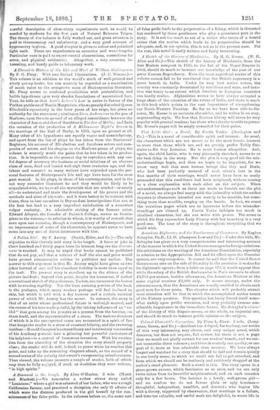A Fallen Ido'. By F. Anstey. (Smith, Elder, and Co.)—The
only objection to this cleverly told story is its length. A farce or joke in three hundred and thirty pages loses its interest long ere the denoue- ment is reached. It may be urged that books cannot be published that do not pay, and that a volume of half the size and price would have proved remunerative neither to publisher nor author. The answer to this argument is that Mr. Anstey might have given us two jokes instead of one, and his abundant fertility is more than equal to the task. The present story is excellent up to the climax of the picture incident ; beyond that point, despite the humorous, if rather conventional sketch of the policeman, Yarker, one turns over the leaves with increasing rapidity. Not the least amusing portion of the book is the prologue, which many readers perhaps will feel inclined to skip, but which is told with a dry humour and a certain satirical power of which Mr. Anstey has the secret. In essence, the story is that of an artist whose professional future is well-nigh marred, and the course of his love made painful, by the tricksy influence of an " ex- idol " that gets among his penates as a present from the heroine,--a sham itself, and the representative of a sham. The various disasters of which it is the unsuspected cause are recounted in a spirit of fun that keeps the reader in a state of constant hilarity, and the crowning incident—Ronald Campion's extraordinary and involuntary conversion of his Academy portrait into a grinning but powerful caricature of his ladylove—is a marvel of humorous invention. With his extrica- tion from the absurdity of the situation the story should properly close ; the reader will do well, indeed, to pause when he reaches this point, and take up the remainiog chapters afresh, as the record of a second series of the unlucky idol-owner's exasperating misadventures. Thus viewed, the volume presents a couple of stories, both of which may then be fatly enjoyed, if read, as doubtless they were written, "in high spirits."


































 Previous page
Previous page